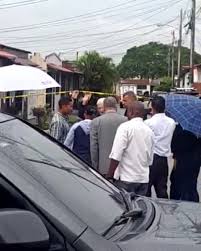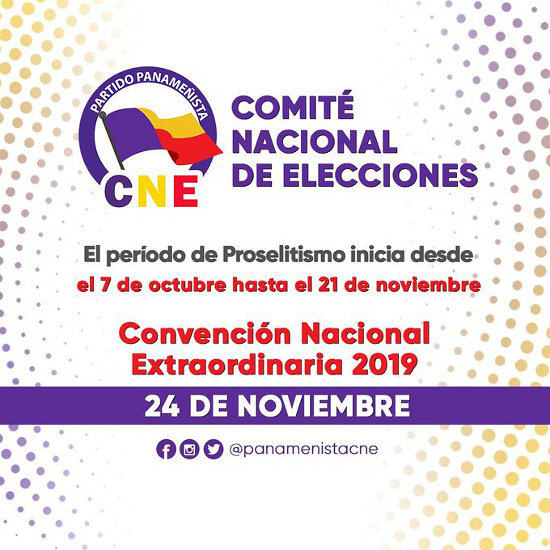The powers that be when this administration and legislature took office. Photo by the Asamblea Nacional.
Look to what’s happening, not his public pronouncements, to know where Nito is at
by Eric Jackson
He touched on all the obligatory points, in the process saying a few things that conflict with what some in his party are pushing, when he spoke to the United Nations. La Prensa called President Laurentino “Nito” Cortizo Cohen’s speech boring. Others lamented the lack of any new vision, new theme, new label. A president with little to say, because he really doesn’t stand for anything? The hushed concentration of an old military cadet concentrating as he walks through a mine field? Or is it just the natural style of a man of few words?
Minister of Public Works Rafael Sabonge assures us that there are a few details to be worked out, but the fourth bridge project, which has been contracted out to the China Construction Communication Company and China Harbor Engineering Company group will be going ahead with construction shortly. But Roberto Abrego, the PRD deputy who heads the National Assembly’s Public Infrastructure Subcommittee, says that at first glance the subcommittee considers the contract to be against Panama’s best interests.
Those companies are in many ways the Asian analog to Brazil’s Odebrecht — involved in scandal after scandal, multiply blacklisted by international financial institutions — but since when did this batch of legislators NOT like deals with companies that pay kickbacks? Cortizo says that corruption won’t be tolerated in his administration and if it is encountered complaints will be filed with the pertinent authorities and the government will move on rather than get bogged down over it. And when Odebrecht asked for a waiver of penalties for not completing the new concourse at Tocumen Airport on time? Request denied, with someone other than Cortizo making that announcement.
Do we take the president at his word when he declares that he will strictly respect constitutional separations of powers, leaving legislation to the legislators and the application and interpretation of the law to the courts? God save Panama from the honorable magistrates and deputies.
Do we take the vulgar and thuggish PRD mayor of Colon, Alex Lee, at his word when he said that he talked to the president about the huge pay raise he gave himself and that it was acceptable from on high? Or do we notice that shortly thereafter Lee backtracked and rescinded that measure? (And, in light of the mayor’s rhetoric and characterizations, do we want to spin it as the mayor getting beaten up by queers?)
It may actually be that Lee wasn’t lying, that in person Cortizo assumed a tolerant and non-judgmental attitude with him. More and more, it would seem more likely that any talking about the mayor’s scandalous conduct would have been done by Vice President José Gabriel Carrizo, the former banker who is also Minister of the Presidency. As in, when it’s a matter of drumming up public support and adulation, dealing with foreigners and powerful multinational institutions in search of business for Panama and so on, Cortizo does the public speaking, but when it’s a matter of imposing limits on other politicians Carrizo does the speaking without the press present.
Call the president what you will, but more and more it appears that his usual method of operation is to leave the talking about that which is controversial to his ministers.
It will work up to a point. That point is likely to be when he has to deal with a legislature that, if one listens to the noise, has very different priorities than those which he enunciates.

Ricky’s image. Ricardo Martinelli, out of prison on a factually absurd verdict, is running to retake control of the Cambio Democratico party that he founded but which elected corporate lawyer Rómulo Roux during the ex-president’s incarceration. Here, from a video taken by a neighbor and widely circulated among the social media, Martinelli crosses the yellow ribbon of a police crime scene cordon in Las Acasias, where former police captain and attorney Francisco Grajales was shot dead in the street, gangland-style. The slain man was forced out of the police over drugs missing from the evidence storage and made his living largely by representing drug underworld characters, actual or alleged. Grajales’s wife, attorney Jessica Canto, has a drug conviction of her own on the record and is one of the team of Martinelli’s criminal defense lawyers.
The opposition’s weakness may not be Cortizo’s strength
Are you going to import a left to right spectrum, or a government and opposition paradigm, from someplace else to characterize Panamanian politics? You may be mistaken.
Noriega times shattered the PRD and its junior partners, the latter parties which did not long survive the invasion. (Anyone remember PALA, the “Labor Party” known as “rich man’s PRD,” to which Mayín Correa once upon a time belonged?)
The post-invasion Endara administration saw the disintegration of an opposition whose unity was an unnatural confluence of domestic and external influences. The Civilista white hankies were to some extent a prototype of the CIA-orchestrated “color revolutions” at which the Russian Federation likes to point, but Panamanians largely did agree that the dictatorship had to end even if they could never unite to actually force that point. By the 1994 elections the PRD held onto its around one-third of the electorate base and that was enough to make Ernesto “Toro” Pérez Balladares president in a seven-way race.
Toro tried to discipline his party and its legislative caucus, with big spectacles like the expulsion of Bocas del Toro deputy Mario Miller from the PRD and the legislature over extortion allegations and the arrest and humiliation of a Panamanian diplomat amidst an international gathering here, on charges of dipping into the till of consular collections for ship registration fees. Uncle Sam was unimpressed, pulling Toro’s US visa for the sale of visas and passports to Chinese citizens right after he left office. Miller beat the rap on appeal, went elsewhere politically, and came back to the legislature as a Cambio Democratico (CD) deputy.
Mireya Moscoso succeeded on the Panameñista ticket and navigated through a legislature of many an veteran deputy wearing a different uniform than before. Her administration was not about building the party her late husband created, but showering goodies on a tiny circle of family and friends. When she needed that extra vote to jam her Supreme Court nominees through the legislature, she bought a PRD deputy, Carlos “Tito” Afú from Los Santos, for that occasion. The next time around Tito came back as a Panameñista deputy but has since migrated to CD.
When Martín Torrijos came back in on the PRD third plus some, it was a matter of the usual succession but by then all politics had become transactional. Yes, he put on these technocratic airs, wielded great publicity power with the ad agency cartel mostly on his side and mobilized his party to win a sparsely attended canal referendum in 2006. But it was a sell individual souls and Panama as if there would be no tomorrow time, and that effect has only deepened. Perhaps the tawdriest moment of that was when Colombian racketeer David Murcia Guzmán got diplomatic honors from the legislature and a bodyguard detail from the SPI presidential guards.
Malignant Brazilian imperialism, in the juridical person of the thug construction conglomerate Odebrecht, got its foot in Panama’s door in Martín Torrijos times and then moved in big during the Martinelli and Varela administrations. Martinelli, who has served as Seguro Social director under Torrijos and Minister of Canal Affairs under Moscoso, came in with third place legislative caucus but through bribery and extortion — but WAIT! they say it’s a crime to call it that when the courts have never ruled as such! –assembled a National Assembly majority with turncoats from other parties.
Martinelli considered himself betrayed when the nation rejected a puppet slate that would have left him effectively still at the helm of state, so he turned on the CD legislative caucus, warning that he had files on every member and would use them against those who did not do as he told them.
But hey, the Panamanian sports scene was a slush fund for legislators, Odebrecht, its partners and subsidiaries and its domestic imitators were not picky on partisan lines about to whom they kicked back money from overpriced public works contracts, and Varela also came into office with his party wielding a puny minority in the legislature.
With Martinelli making his threats, first in person and later from exile and later yet from prison awaiting trial, Varela indisposed to do Martinelli-style arm twists and the PRD in shock from having lost two general elections in a row, the deputies were left to their own devices and with the president at their mercy. At first, dissident CD and PRD deputies ignored their party leaders, who wanted to impeach Varela as their first order of business. They formed a temporary “governability pact” to avoid total public sector paralysis, with a grateful Varela leaving them to their games.
(WHY would impeachment seem like such a good idea to Martinelli and the PRD heavies of the time? That would put VP Isabel de Saint Malo, an independent, in the president’s chair — and after all, didn’t her brother Raúl launder Odebrecht bribes for the Martinelli family?)
Eventually, as contemplated, the pact dissolved as the PRD and CD caucuses united to block Varela’s appointments — good ones and bad ones — in order to establish their apparent bona fides as “the opposition” ahead of the May 2019 elections.
Nito and the PRD won that contest, with the party narrowly winning the presidency on the strength of its usual third of the vote, but sweeping most local offices and winning nearly a majority in the legislature and a safe majority when one counts in their MOLIRENA junior partners.
However, both in the PRD caucus and in others, you have a legislative culture in which individual deputies are now long used to thumbing their noses at party bosses. From the PRD ranks they elected the little-known and not saying things to make himself known deputy Marcos Castillero as National Assembly president, and the firebrand demagogue Zulay Rodríguez — whom Nito crushed in the PRD’s presidential primary — as the legislature’s vice president.
Since this assembly’s installation in July Zulay has been the prime mover of a bewildering agenda of legislation, with assists from deputies of other parties. It has nothing to do with what Cortizo says he’s trying to do.
There are all sorts of foreigner-bashing, most notoriously with what would in effect be a ban on foreign music on Panamanian radio and surely consequent international cultural and tourism boycott of Panama. Never mind that the president wants to revive a moribund tourism sector. All sorts of financial demagoguery favoring this or that special interest — the privatization of health care by requiring all persons aged 60 or over to get private insurance, with means-tested exceptions under rules to be set by a board of insurance company execs is the latest coming from CD and Panameñista ranks. Demands for hack jobs for PRD and MOLIRENA activists. Never mind that Cortizo’s stated policy is austerity in the face of a debt crisis. All manner of blame assignment, lots of it directed against the Motta family, lots of it downright racist, much of it spun online through an array of false persona trolls. From MOLIRENA et al, a proposal coming out of the international religious far right to create a registry of women who have miscarriages or who deliver stillborn babies. The crudest sort of gay bashing.
So what does Nito do if some of this gets to his desk for signature or veto? And what does he do if key elements of what he wants to do get rejected in the legislature?

In another opposition caucus, there is an election race, really a repeat of the last presidential primary contest, to see whether former Panama City mayor José Isabel Blandón Figueroa or former housing minister Mario Enrique Etchelecu Álvarez. Their party barely scored in double digits last May and both men have some unflattering political baggage, the former of an Odebrecht variety and the latter of a land titles scams variety. (Not that either has been charged with a crime or will be, but certain things happened on their respective watches.)
Splintering, shattering or usual but manageable fragmentation?
On September 23, 11 deputies sent a note to Marcos Castillero, requesting to form a new caucus. The deadline for this came and went in the first half of July, so officially it’s not happening. The note contained the names of CD members Sergio Gálvez, Leopoldo Benedetti, Mayín Correa, Hernán Delgado, Arnulfo Díaz, José María Herrera, Alaín Cedeño and Fátima Agrazal, all staunch Martinelli loyalists.
Named and signed were Panameñista deputies Elías Vigil and Pedro Torres, although the latter then clarified that he didn’t want to leave the Panameñista caucus. Also named in the document, but not signed, was Manolo Ruiz, a MOLIRENA deputy who migrated there from CD and currently head of the MOLIRENA delegation in the National Assembly, which is formally allied with the PRD.
Were the entire MOLIRENA caucus to desert its alliance with the PRD, then all of a sudden President Cortizo’s party would be a vote short control of the National Assembly.
Just the usual self-centered stuff from the political caste? Perhaps. It comes, however, in a time of a debt squeeze and Cortizo’s efforts to address it by way of austerity policies. Martinelli may be rich enough to provide deputies who join his caucus with the picnic hams, small children’s toys, soccer balls, domestic appliances and other goodies that politicians pass out to build and keep loyal followings.
Do not discount the effect that might have in times of weak party discipline, selfish and corrupt deputies and jaded constituencies used to being paid in more than good words for their votes.
Contact us by email at fund4thepanamanews@gmail.com
These links are interactive — click on the boxes













